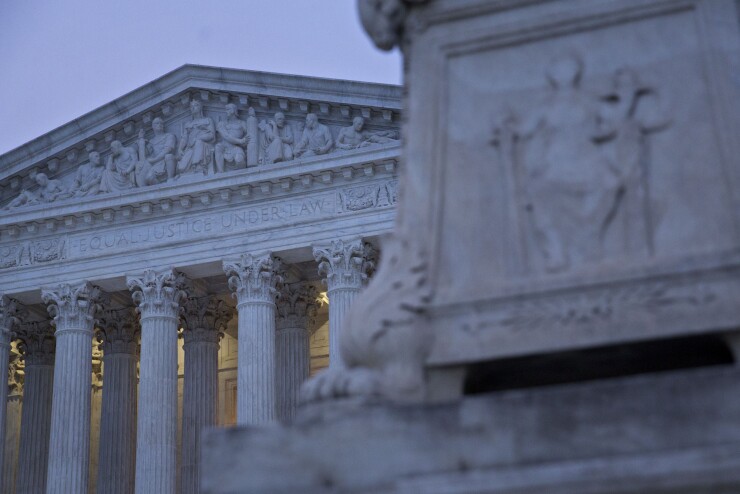The Supreme Court decision in Bittner v. U.S. finally dispelled the confusion among practitioners and taxpayers regarding penalties associated with the Bank Secrecy Act's penalties.
The act and its implementing regulations require U.S. persons with certain financial interests in foreign accounts to file an annual report known as an FBAR — the Report of Foreign Bank and Financial Accounts — and the statute imposes a maximum $10,000 penalty for nonwillful violations of the law.
Alexandru Bittner immigrated to the U.S. at a young age in 1982 and became a naturalized citizen. He returned to Romania in 1990 where he launched a successful business career. He returned to the U.S. from Romania in 2011, and, after learning of the BSA reporting provision, he subsequently submitted the required annual reports covering five years, from 2007 through 2011.
The government deemed his late-filed reports deficient because they did not include all accounts on which he had either signatory authority or a qualifying interest. Bittner filed corrected FBARs providing information for each of his accounts. These included 61 accounts in 2007, 51 in 2008, 53 in 2009 and 2010, and 54 in 2011.
The Treasury did not contest the accuracy of the new filings nor did it suggest that his previous errors were willful. But because the government took the view that nonwillful penalties apply to each account not accurately or timely reported, and because Bittner's five later-filed annual reports collectively involved 272 accounts, the government calculated the penalty due at $2.72 million. Bittner challenged that penalty in court, arguing that the BSA authorized a maximum penalty for nonwillful violations of $10,000 per report, not $10,000 per account.
The Fifth Circuit upheld the government's assessment.
Fortunately for Bittner, the U.S. Supreme Court, in a recent 5-4 decision, reversed. It held that the BSA's maximum penalty for the nonwillful failure to file a compliant report accrues on a per-report, not a per-account, basis.
Going forward
Now that the IRS has clearer guidance, some professionals predict that it will start looking more closely at the willful versus nonwillful standard in filing the form late or incorrectly.
"The court will look more closely as to the reasonableness in filing late," said Diane Nobile, a tax attorney at law firm Saul Ewing. "The willfulness standard will be even more heavily interpreted and scrutinized."
Not many countries require citizens who live elsewhere to report their foreign interests, so it is reasonable that someone not living in the U.S. would be unaware of the requirement, observed Nobile.
"The 'per account' interpretation seemed to be excessive, and I don't think it was Congress' intent to be that draconian in the extreme results that resulted. That's why we have regulations to interpret what the statute says. The issue of willfulness plays a heavy role, because nonwilfulness brings us into the realm of criminal sanctions," she added.
The court was closely divided on the issue, but so were Nobile's colleagues.
"I voiced my opinion when the decision was announced, and some colleagues at the firm said that they felt it could have gone the other way — that's why it was a 5-4 decision," she said. "No one wanted it to be interpreted on a 'per account' basis, but many did interpret it that way for fear of not complying. They wanted to interpret it in the most cautious way that they could feel comfortable doing. The penalties in the international world are very severe, and it may not occur to a CPA that is focused on domestic issues to ask their client if they had a foreign financial account."
In reaching its decision, the court's four conservative justices were joined by Justice Jackson regarding the meaning of the statute, remarked Reuben Muller, a tax attorney at law firm Cole Schotz.
"Her questioning on oral argument shows a concern with the victim, so the liberal flank was not with Justice Jackson in this. The concern of the other four justices [Thomas, Alito, Gorsuch, and Barrett] was on government overreach — the government going over the line in penalizing more than the law intended."
"For many that have been negatively affected by the 'per account' interpretation, the decision will enable them to file for refunds," he suggested. "In fact, it would not be surprising if the government issues a procedure for them to do so."
Until the Supreme Court resolved the issue in deciding Bittner's appeal from the Fifth Circuit, there was a split among the courts as to how the penalty should be applied.
Prior to the decision, many taxpayers elected to settle their cases and pay increased penalties based on a mistaken reading of the law that allowed the IRS to recover penalties for nonwillful violations on a per-account basis, according to Archer attorneys Mark Oberstaedt and Kenneth Wahl, who successfully argued a similar, precedent-setting case on behalf of a New Jersey taxpayer in 2021.
In the case they tried, U.S. v. Giraldi, both Oberstaedt and Ahl represented the client through the process with the IRS. Eventually the IRS filed suit to collect the penalty, and Oberstaedt got involved in the litigation, winning on partial summary judgment in district court. The case was a matter of first impression in the Third Circuit and was only the fourth federal court decision to address the penalty issue under the BSA, according to Oberstaedt.

"One problem with these kinds of cases is that you never know what position the government will take on whether the client has been willful or nonwillful in failing to file an FBAR — the penalty in both cases can be substantial," said Ahl. "The interpretation of the statute by the Supreme Court in Bittner follows an approach that could apply to interpret a lot of other statutes, so it has a broader application than just to people with foreign accounts. It lays out the form of how you approach a statute that doesn't have specific language in it determining what congressional intention was in writing the statute."
When an IRS examiner is looking at an FBAR case, they're trying to assemble all the factors as to why the taxpayer did not report the bank account or accounts, Oberstaedt indicated. They look at the tax return, the prior history, and other agents' reports, and make their decision.
"There have been a number of cases going in the direction of finding willfulness where people would say that it doesn't necessarily prove it is," he said. "To be 'willful' generally means trying to hide the account or that you're unwilling to report the income on your return."
The IRS, in response to Bittner, could toughen its posture in such cases, by taking the position that more violations were willful, according to Ahl and Oberstaedt.
"This stance would give the agency more flexibility to issue penalties, but it could also threaten taxpayers who did not know they had run afoul of U.S. tax law," said Ahl.
"It's our belief that those who voluntarily paid penalties will be able to file claims for illegal exaction, " said Oberstaedt. "That would be a claim against the government for repayment of a penalty that shouldn't have been collected.
"Taxpayers who paid the penalty voluntarily should be able to file in district court or the Court of Claims," he said. "If they litigated and settled their case, the agreement and circumstances that lead up to it need to be looked at. For example, if the court was asked to interpret the statute and adopted the government's interpretation, then there would be a basis to undo the settlement agreement."
The Bittner case may result in the IRS potentially bringing more willful penalties, agreed Brett Cotler, a tax attorney at Seward & Kissel. "But from a taxpayer's point of view, it may result in earlier settlements in nonwillful FBAR audits, knowing they will have a $10,000 penalty. A lot would consider that to be more attractive to wrap up the case and pay the $10,000, rather than go through protracted litigation."





